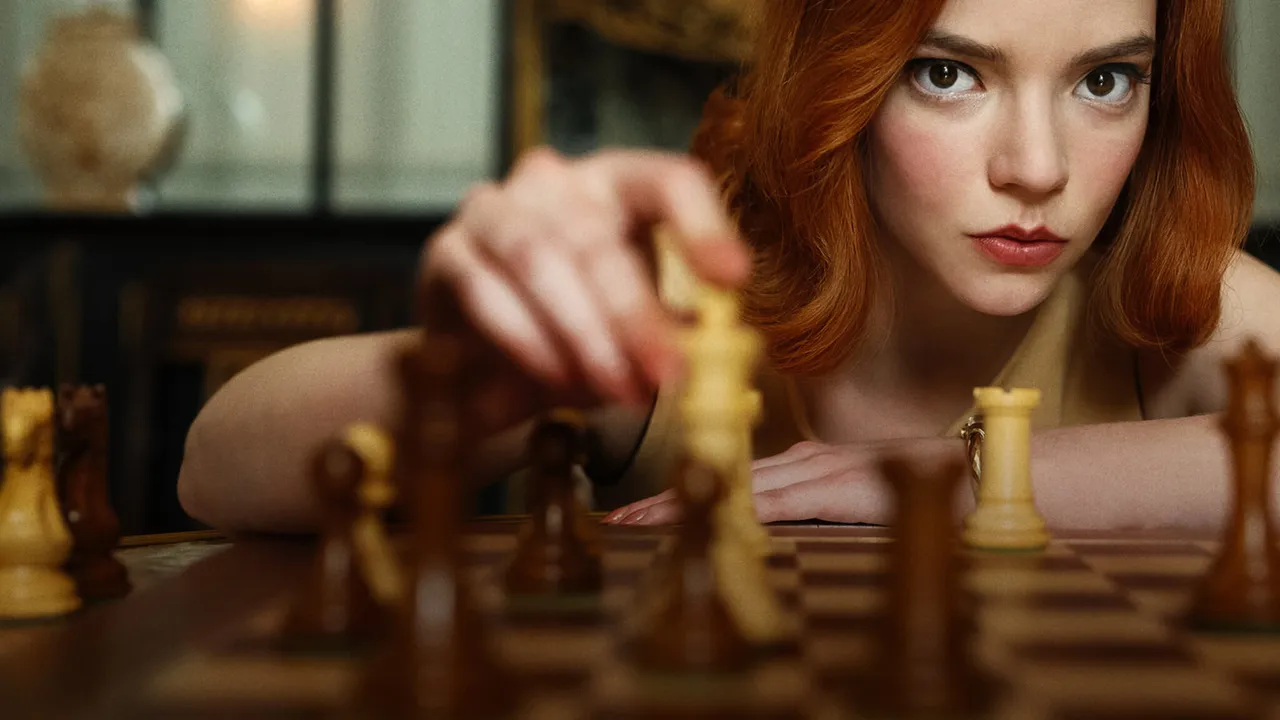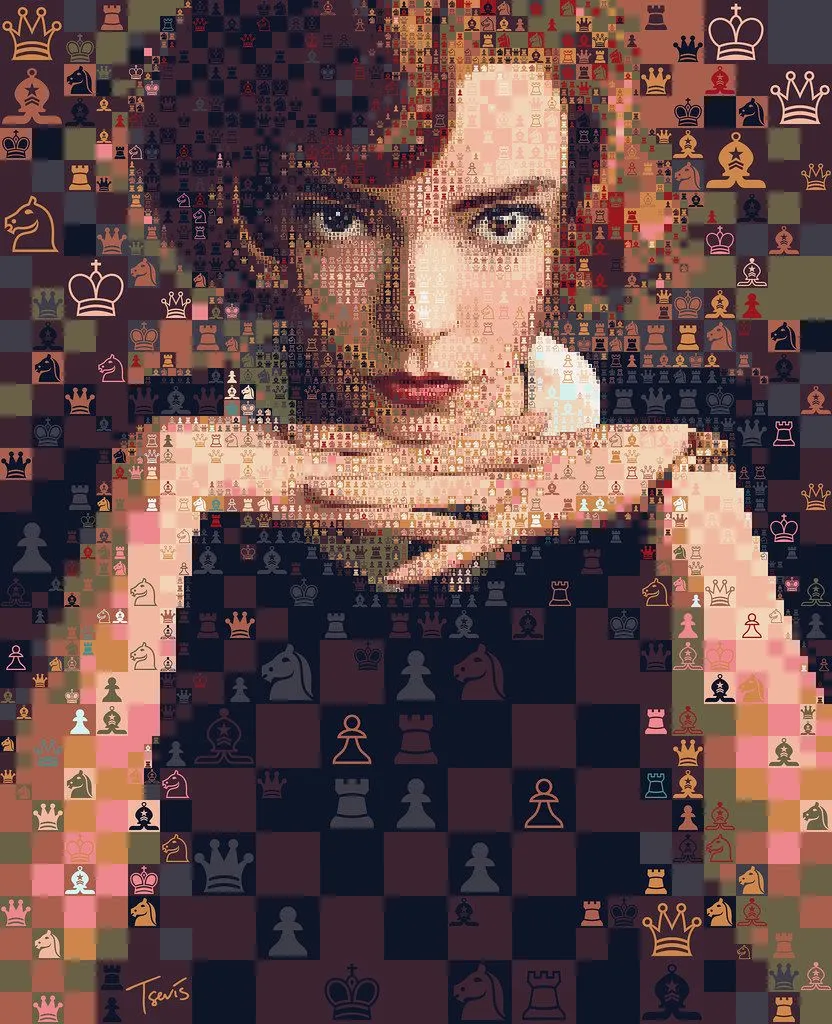
If I were to ask a rhetorical question on the air about the five greatest players in the history of chess and, above all, their nationalities and facts about their lives and how they came to become geniuses in such a gruelling and challenging discipline as this "board game", it would probably be a question with very few answers. Not because it represents a mystery, but because the very history of chess itself is unpopular. In other words, in the West, especially in the Americas, the culture regarding chess is very poor and attention tends to be directed towards other sports, disciplines or activities. Obviously, all this before Netflix made "The Queen's Gambit" public and available on its popular streaming platform.
Although "The Queen's Gambit" is an ode to the mastery behind the simple act of moving pieces with the intention of defeating your opponent (the classic action of chess), it is by no means a simple series. In fact, it is so well crafted and deeply scripted that the themes it touches on over the course of its seven episodes are simply rich in material. For example, the way it deals with obsession, alcoholism and the subtle but still detectable argument about obsessive-compulsive disorder are in themselves enough elements to make multiple posts. However, the majesty of this Netflix limited series lies in how intelligence trumps talent every time. And furthermore, that discipline is the mother of virtues.
Si yo realizara una pregunta retórica al aire sobre los mejores cinco jugadores de la historia del ajedrez y sobre todo, de sus nacionalidad y datos sobre sus vidas y cómo llegaron a convertirse en genio de una disciplina tan desgastante y desafiante como lo es este "juego de mesa"; probablemente sería una pregunta con muy pocas respuestas. No porque represente un misterio, sino porque la propia historia del ajedrez en sí es poco popular. Dicho de otro modo, en Occidente, especialmente en Las Américas, la cultura con respecto a ésto es muy pobre y la atención suele dirigirse hacia otros deportes, disciplinas o actividades. Obviamente, todo esto antes de que Netflix, hiciera público y disponible "The Queen's Gambit" dentro de su conocida plataforma de streaming.
Aunque "The Queen's Gambit", es una oda a la maestría detrás del simple hecho de mover fichas con la intención de vencer a tu oponente (el accionar clásico del ajedrez), no es para nada una serie simple. De hecho, está tan bien elaborada y su guión es tan profundo, que los temas que toca durante el transcurso de sus 7 episodios es sencillamente riquísimo en material. Por ejemplo, el cómo aborda la obsesión, el alcoholismo y la sutil pero aún detectable argumentación sobre el trastorno obsesivo-compulsivo, son en sí suficiente elementos para realizar múltiples posts. Sin embargo, la majestuosidad de esta serie limitada de Netflix está en cómo la inteligencia vence siempre al talento. Y además, que la disciplina es la madre de las virtudes.

If you have read some of my past posts about other series and films, you will already know that I don't usually do spoilers. In fact, my reviews go more in the direction of motivating the reader so that they can feel that their time is not wasted, while I try to relate the characteristics that exist in those productions. In this case, the story revolves around a girl who from a very early age experiences a truly traumatic event, which causes her psyche to adopt isolationism and emotional distance. That same characteristic, curiously enough, is what will make her successful in the very testosterone-filled world of chess tournaments. Thanks to an unusual teacher, and her intelligence (by inheritance, mind you), she manages to stand out in an almost insurmountable way.
This is how Beth (the name of the protagonist of this fictional story, based, in some elements, on real events) begins her very controversial story. Both as a chess player, but also as a woman who has to deal with a number of obstacles and assumptions typical of the society in which the story is based. So much for the grey but informative synopsis of this Netflix limited series. From now on, I will focus on how "everything is connected" and then determine who we will be in the future. Both in terms of personality and in terms of successes and achievements. This story is sublime precisely because of that. It has an overly rich story arc and for eyes that have a certain sensitivity for the humanities, certain nods to literature, philosophy (especially this aspect) and even haute couture will not go unnoticed.
Si han leído algunos de mis posts pasados sobre otras series y películas, ya sabrán que no suelo hacer spoilers. Es más, mis reseñas van más en dirección a motivar al lector a que puedan sentir que su tiempo no va a desperdiciarse, mientras intento relatar las características que en dichas producciones existen. En este caso, la historia gira alrededor de una chica que desde muy temprana edad experimenta un hecho realmente traumático, que hace que si psique adopte el aislacionismo y la distancia emocional. Ésa misma característica, curiosamente, es la que hará que sea exitosa en el muy lleno de testosterona mundo de los torneos de ajedrez. Donde, gracias a un inusual maestro, y sus dotes de inteligencia (por herencia, ojo al dato) logra destacar de un modo casi insuperable.
Es así, como Beth, (el nombre de la protagonista de esta historia ficticia, basada, en algunos elementos en hechos reales) que empieza su muy polémica historia. Tanto como ajedrecista, pero también como una mujer que debe acoplarse a un sin número de obstáculos y presunciones típicas de la sociedad en la que está basada la historia. Hasta aquí la gris pero informativa sinopsis de esta serie limitada de Netflix. De ahora en más, me centraré en cómo "todo está conectado" para luego, determinar quiénes seremos en un futuro. Tanto en términos de personalidad como de éxitos y logros. Esta historia es sublime es precisamente por eso. Tiene un arco argumentativo demasiado nutrido y que para ojos que tengan cierta sensibilidad por las humanidades, no pasarán desapercibidas ciertos guiños hacia la literatura, la filosofía (sobre todo este aspecto) e incluso la alta costura.

Are obsessions good, or on the contrary, do they represent a danger? This highly rhetorical question contains a fairly direct link to the plot that is implicit from chapter two of the series. And basically, they are the basis of a personality that is constantly in search of a recognition that, even after the end of the series, I'm not entirely sure it has been able to find. But by this I don't mean, on the level of his peers, i.e. professional recognition. No. In fact, fitting in or finding one's way to where and how to fit in is the underlying key within this excellent production. By way of confession, I was able to see it but without expecting anything in return. Just for the mere fact that it was trending on the platform at the very moment I decided to "give it a chance".
And in this sense, I think it captivates even more. When cynicism and a certain animosity play against you, and it's a delightful surprise to come across a series (however limited) that never fails to impress. Also, I admit that from a strictly technical point of view, that is, the way I play chess with tactics and craft, well, I'm not very good at it. I think, and I am quite considerate of myself, that "moving the pieces" is the one and only thing I really know how to do. More without any tactics or ingenuity. Like throwing a stone into the calm waters of a lake in absolute stillness. It may be fun for a moment, but it is no feat of intelligence at all.
¿Son las obsesiones buenas, o por el contrario, representan un peligro? Esta pregunta, sumamente retórica, contiene un vínculo bastante directo con la trama que está implícita desde el capítulo dos de la serie. Y básicamente, son la base de una personalidad que constantemente está en busca de un reconocimiento que, incluso terminada la serie, no estoy del todo seguro que haya podido encontrar. Pero con esto no digo, en el plano de sus semejantes; es decir: reconocimiento profesional. No. De hecho, encajar o hallar el camino hacia dónde y cómo encajar es la clave subyacente dentro de esta excelente producción. Que a modo de confesión, la pude ver pero sin esperar nada a cambio. Solo por el mero hecho de haber sido trending en la plataforma justo en el momento en que decidí "darle una oportunidad".
Y en este sentido, creo que cautiva aún más. Cuando el cinismo y cierta animadversión te juegan en contra, y resulta una sorpresa encantadora el hecho de toparte con una serie (así sea limitada) que jamás para de impresionarte. Además, admito que desde el plano estrictamente técnico, es decir, el modo de jugar ajedrez con tácticas y oficio, pues muy bien no se me da. Creo, y soy bastante considerado conmigo mismo, que "mover las piezas" es lo único y exclusivo que realmente sé hacer. Más sin táctica o ingenio alguno. Como quien lanza una piedra en las calmadas aguas de un lago en quietud absoluta. Quizá, pueda ser divertido por un instante, pero para nada representa una proeza de la inteligencia.

Of course, if we are referring to the most excellent game of intelligence, we are clearly talking about chess. In "The Queen's Gambit", how this discipline achieves excellence, respect and glory is in itself something else. But the part that I think stands out is that Netflix, and the producers and scriptwriters, by using a girl as the main character, get it right in the empowerment of women. A facet, from my point of view, not at all forced and perfectly possible and plausible. In addition, the structures of machismo are also addressed in this limited series. In conclusion, if there is one thing you should invest your time in, and at the same time receive amazingly well-made content, it is this mini-series. Seven episodes. In other words, in one day, marathoned, you can watch the whole thing. Totally recommended.
Por supuesto, si nos referimos al juego de la inteligencia por excelente, claramente estamos hablando del ajedrez. En "The Queen's Gambit" el cómo a través de esta disciplina se alcanza la excelente, el respeto y la gloria es en sí algo aparte. Pero la parte que pienso destacar es que Netflix, y los productores y guionistas, al usar a una chica como protagonista, aciertan en el empoderamiento de la mujer. Una faceta, desde mi punto de vista, nada forzada y perfectamente posible y plausible. Además, las estructuras del machismo también son abordadas dentro de esta serie limitada. En conclusión, si en algo debes invertir tu tiempo, y al mismo tiempo recibir un contenido asombrosamente bien hecho, es en esta miniserie ¿Duración total? Siete episodios. Dicho de otro modo, en un día, maratoneando, la podrás ver entera. Recomendada.

